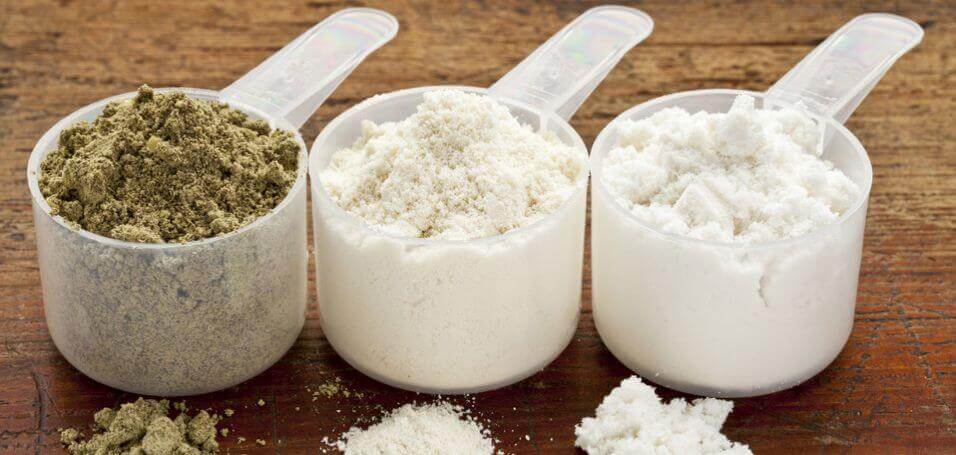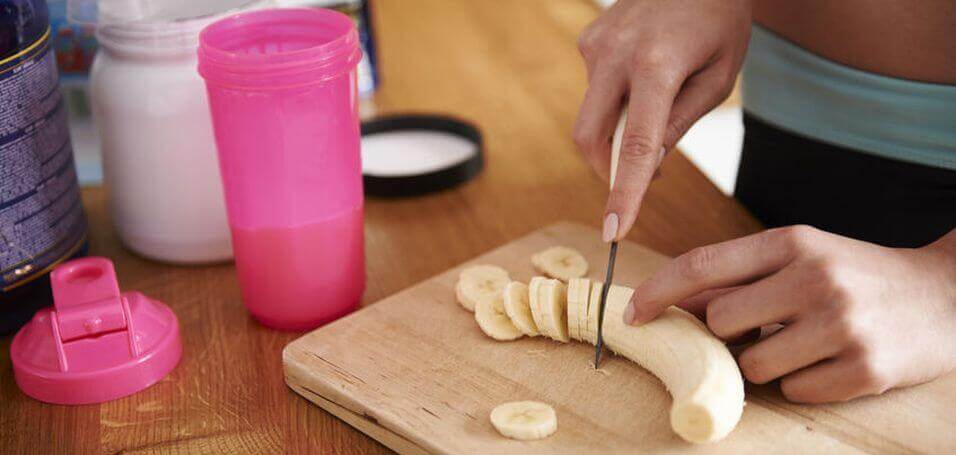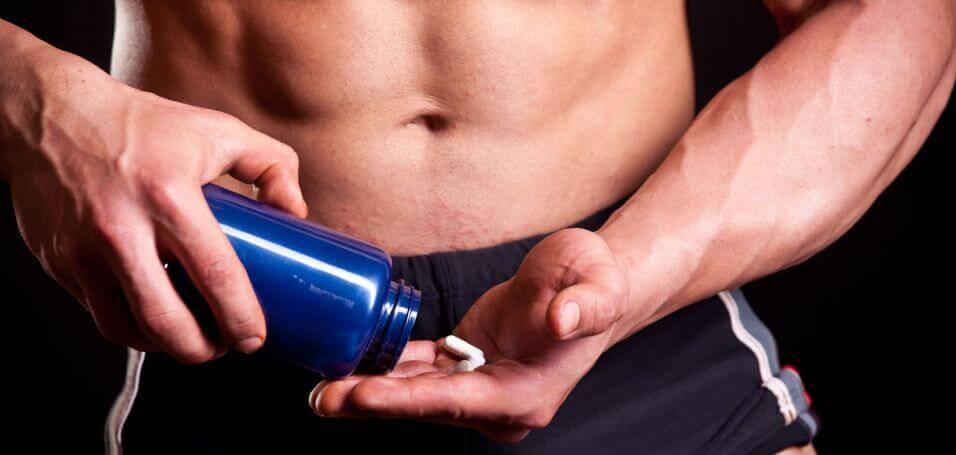One of the first pieces of bodybuilding advice I was given was on post-workout nutrition.
If I didn’t eat protein and carbs immediately after training, I was told, I’d miss an opportunity to accelerate muscle growth, if not directly hinder it.
And so I did, after every workout, without fail.
Chances are you’ve heard the same things. Bodybuilders and gymbros alike have been singing post-workout nutrition’s praises for decades.
How important is it really, though? Does eating after workouts actually help us build muscle faster?
Well, the long story short is this:
Post-workout nutrition isn’t as crucial as many would have us believe, but it’s not entirely without merit, either.
And in this article, you’re going to find out why.
By the end, you’re going to know why post-workout nutrition is even a “thing,” the ideal type of post-workout meal, the truth about the “anabolic window,” and more.
Let’s get started.
- Why Post-Workout Nutrition?
- Should You Eat Protein After a Workout?
- Should You Eat Carbs After a Workout?
- Should You Eat Fat After a Workout?
- How Soon After a Workout Should You Eat?
- What About Post-Workout Supplements?
- The Bottom Line on Post-Workout Nutrition
Table of Contents
+Want to listen to more stuff like this? Check out my podcast!
Why Post-Workout Nutrition?
Every day, your body is constantly breaking down and rebuilding muscle proteins.
This process is known as “protein turnover,” and when viewed on the whole, breakdown and synthesis rates generally balance each other out.
When you exercise, however, things change.
Research shows that protein synthesis rates decline during resistance training and cardio, and that protein breakdown rates rise sharply soon after you finish working out.
In other words, exercise is a catabolic activity, and this is especially true with fasted training and longer workouts.
(This is why the bodybuilding adage that you don’t build muscle in the gym is true. Workouts break muscle tissue down, and the repair, recovery, and growth occurs during the “downtime” in between workouts.)
Now, mechanically speaking, muscle growth is the result of protein synthesis rates exceeding breakdown rates over extended periods of time.
Therefore, if you want to gain muscle as quickly as possible, then you want to do everything you can to keep protein synthesis rates at or above breakdown rates.
The more time your body spends in this anabolic state, the faster you gain muscle.
That’s one of the reasons you need to eat enough calories and protein every day, why various strategies to accelerate muscle recovery can help, and why post-workout nutrition is a staple in the world of bodybuilding.
The goal of the post-workout meal is simple:
Curb muscle breakdown and punch up muscle synthesis rates.
And it works.
That’s the idea, anyway. How does it actually play out, though?
Should You Eat Protein After a Workout?

Yes, it’s a good idea to eat protein after a workout.
Here’s why…
1. It stimulates muscle protein synthesis rates, initiating muscle building.
We recall that once we finish working out, muscle breakdown rates go on the rise, easily surpassing synthesis rates.
Muscle gain can’t occur until this reverses (synthesis rates outstrip breakdown rates), and eating protein does exactly that.
The primary drivers here are the amino acid leucine, which directly stimulates protein synthesis and is particularly abundant in certain types of protein, like whey and beef, and the hormone insulin, which suppresses muscle breakdown rates and delivers nutrition to your cells.
So, in short, you eat protein, and your body digest and breaks it down into its constituent amino acids, which include leucine.
These amino acids are then absorbed into your bloodstream along with insulin, which slows down muscle breakdown rates and gets the wheels of muscle protein synthesis to start turning.
2. Protein eaten after a workout stimulates more protein synthesis than when eaten at rest.
Eating protein stimulates muscle protein synthesis regardless of when you eat it, but eating it after a workout amplifies these effects.
Should You Eat Carbs After a Workout?

Maybe.
We’re often told to eat carbs after working out to spike insulin levels, which is supposed to supercharge muscle growth through various anabolic mechanisms.
Unfortunately, studies suggest this doesn’t work. Adding carbs to your post-workout meals doesn’t appear to accelerate muscle gain.
The reason for this is only moderate elevations of insulin are needed to maximize muscle protein synthesis rates when combined with a sufficient dose of protein, which itself is enough to achieve the desired insulin concentrations.
I will note, though, that adding carbs to your post-workout meal will keep insulin levels elevated for longer, which is desirable from a muscle-building standpoint because, as you know, insulin suppresses muscle breakdown rates.
This is one of the reasons why high-carb diets are better for gaining muscle than low-carb ones:
High-carb diets result in generally higher insulin levels, which in turn produces generally lower muscle breakdown rates.
One other benefit to carbing up post-workout is refilling your muscles with glycogen, which is burned as energy when you exercise, and especially during high-intensity exercise.
This whole-body glycogen replenishment can give you a nice post-workout pump and mood boost, but it doesn’t appear to improve overall workout performance unless you’ll be training again later in the same day.
In other words, you don’t need to rush to replenish your glycogen stores unless you’re going to need to call on them again later in the day.
It’s also worth noting that the body won’t store carbs as fat until glycogen stores have been refilled, which is why people often recommend that you eat your most carb-rich meals immediately after you work out.
It’s debatable as to whether this can benefit your body composition over time, but it certainly won’t hurt.
Should You Eat Fat After a Workout?
Sure, if you want to.
Some bodybuilders claim that you shouldn’t because it slows down the process of digesting and absorbing the protein and carbs that your body so desperately needs after a workout.
Well, while it’s true that adding fat to a protein- and/or carb-rich meal slows down the rate at which food is cleared from the stomach, it’s not true that this makes for less effective post-workout nutrition.
For example, studies have repeatedly shown that the fat content of a meal has no effect on glycogen replenishment rates, and that whole milk may be more anabolic than nonfat milk.
So, you don’t need to have fat after you work out, but there’s nothing wrong with it, either.
How Soon After a Workout Should You Eat?
No discussion of post-workout nutrition is complete without mention of the “anabolic window.”
The idea here is that once you’ve finished a workout, you should eat within a certain amount of time to maximize muscle gain (30 to 60 minutes is the general consensus).
If you don’t, the story goes, you’ll fail to gain muscle as quickly as you could.
How true is this, though?
Well, it depends on when you’ve last eaten before a workout.
If you haven’t eaten in the 3 to 4+ hours preceding your workout, it’s likely that your insulin and muscle protein synthesis levels are going to be at a low baseline, and in this case, it would make sense to eat protein soon after.
If you don’t, you’re not missing a special opportunity to gain muscle faster, but your body can’t start building muscle until the machinery is flipped on, and that won’t happen until you eat.
If you have eaten within a few hours of starting your workout, however, and especially if that meal contained a significant amount of protein, then the timing of your post-workout meal is less important.
Your body will still be processing the food you ate, so you can eat immediately after your workout if you want, but you can also wait an hour or two.
(For a more in-depth discussion on the subjects of protein timing and muscle building, check out this article.)
What About Post-Workout Supplements?

There are shelves and shelves of “post-workout supplements” out there that claim to speed up muscle recovery and growth.
Most are bunk, but there are a few options that you should consider:
- Whey protein because it’s rich in leucine and rapidly spikes plasma amino acid levels, making it a particularly good source of post-workout protein.
- Creatine because it helps you gain muscle and strength faster, and research suggests that taking it after working out is best.
- Fish oil because it has an impressive roster of health benefits, and research shows that it can boost muscle protein synthesis levels when combined with food.
The Bottom Line on Post-Workout Nutrition
It’s long been said that your pre- and post-workout meals are the most important meals of the day.
This simply isn’t true.
So long as your diet is set up properly on the whole, no individual meal ranks high above another.
In other words, so long as you’re eating enough calories every day and your macros are set up properly, when you eat isn’t going to make or break your gains.
That said, it is smart to eat protein every few hours if you want to maximize muscle growth, and that will usually entail eating food within an hour or two before and after workouts.
That’s why I generally recommend eating 30 to 40 grams of protein an hour or two before and after you work out.
I also recommend including carbs in those meals too because it makes for better workouts and keeps post-workout insulin levels generally higher.
Last but not least, post-workout meals can contain fat but don’t benefit from it, so go with whatever you prefer.
What’s your take on post-workout nutrition? Have anything else you’d like to share? Let me know in the comments below!
Scientific References +
- Smith, G. I., Atherton, P., Reeds, D. N., Mohammed, B. S., Rankin, D., Rennie, M. J., & Mittendorfer, B. (2011). Omega-3 polyunsaturated fatty acids augment the muscle protein anabolic response to hyperinsulinaemia-hyperaminoacidaemia in healthy young and middle-aged men and women. Clinical Science, 121(6), 267–278. https://doi.org/10.1042/CS20100597
- Antonio, J., & Ciccone, V. (2013). The effects of pre versus post workout supplementation of creatine monohydrate on body composition and strength. Journal of the International Society of Sports Nutrition, 10. https://doi.org/10.1186/1550-2783-10-36
- Dangin, M., Boirie, Y., Garcia-Rodenas, C., Gachon, P., Fauquant, J., Callier, P., Ballèvre, O., & Beaufrère, B. (2001). The digestion rate of protein is an independent regulating factor of postprandial protein retention. American Journal of Physiology - Endocrinology and Metabolism, 280(2 43-2). https://doi.org/10.1152/ajpendo.2001.280.2.e340
- Tang, J. E., Moore, D. R., Kujbida, G. W., Tarnopolsky, M. A., & Phillips, S. M. (2009). Ingestion of whey hydrolysate, casein, or soy protein isolate: Effects on mixed muscle protein synthesis at rest and following resistance exercise in young men. Journal of Applied Physiology, 107(3), 987–992. https://doi.org/10.1152/japplphysiol.00076.2009
- Elliot, T. A., Cree, M. G., Sanford, A. P., Wolfe, R. R., & Tipton, K. D. (2006). Milk ingestion stimulates net muscle protein synthesis following resistance exercise. Medicine and Science in Sports and Exercise, 38(4), 667–674. https://doi.org/10.1249/01.mss.0000210190.64458.25
- Moghaddam, E., Vogt, J. A., & Wolever, T. M. S. (2006). The effects of fat and protein on glycemic responses in nondiabetic humans vary with waist circumference, fasting plasma insulin, and dietary fiber intake. Journal of Nutrition, 136(10), 2506–2511. https://doi.org/10.1093/jn/136.10.2506
- Ivy, J. L. (1998). Glycogen resynthesis after exercise: Effect of carbohydrate intake. International Journal of Sports Medicine, 19(SUPPL. 2). https://doi.org/10.1055/s-2007-971981
- Jentjens, R., & Jeukendrup, A. E. (2003). Determinants of post-exercise glycogen synthesis during short-term recovery. In Sports Medicine (Vol. 33, Issue 2, pp. 117–144). Sports Med. https://doi.org/10.2165/00007256-200333020-00004
- Denne, S. C., Liechty, E. A., Liu, Y. M., Brechtel, G., & Baron, A. D. (1991). Proteolysis in skeletal muscle and whole body in response to euglycemic hyperinsulinemia in normal adults. American Journal of Physiology - Endocrinology and Metabolism, 261(6 24-6). https://doi.org/10.1152/ajpendo.1991.261.6.e809
- Kersten, S. (2001). Mechanisms of nutritional and hormonal regulation of lipogenesis. In EMBO Reports (Vol. 2, Issue 4, pp. 282–286). European Molecular Biology Organization. https://doi.org/10.1093/embo-reports/kve071
- Van Loon, L. J. C., Saris, W. H. M., Verhagen, H., & Wagenmakers, A. J. M. (2000). Plasma insulin responses after ingestion of different amino acid or protein mixtures with carbohydrate. American Journal of Clinical Nutrition, 72(1), 96–105. https://doi.org/10.1093/ajcn/72.1.96
- Greenhaff, P. L., Karagounis, L. G., Peirce, N., Simpson, E. J., Hazell, M., Layfield, R., Wackerhage, H., Smith, K., Atherton, P., Selby, A., & Rennie, M. J. (2008). Disassociation between the effects of amino acids and insulin on signaling, ubiquitin ligases, and protein turnover in human muscle. American Journal of Physiology - Endocrinology and Metabolism, 295(3). https://doi.org/10.1152/ajpendo.90411.2008
- Staples, A. W., Burd, N. A., West, D. W. D., Currie, K. D., Atherton, P. J., Moore, D. R., Rennie, M. J., MacDonald, M. J., Baker, S. K., & Phillips, S. M. (2011). Carbohydrate does not augment exercise-induced protein accretion versus protein alone. Medicine and Science in Sports and Exercise, 43(7), 1154–1161. https://doi.org/10.1249/MSS.0b013e31820751cb
- Hamer, H. M., Wall, B. T., Kiskini, A., De Lange, A., Groen, B. B. L., Bakker, J. A., Gijsen, A. P., Verdijk, L. B., & Van Loon, L. J. C. (2013). Carbohydrate co-ingestion with protein does not further augment post-prandial muscle protein accretion in older men. Nutrition and Metabolism, 10(1), 15. https://doi.org/10.1186/1743-7075-10-15
- Biolo, G., Tipton, K. D., Klein, S., & Wolfe, R. R. (1997). An abundant supply of amino acids enhances the metabolic effect of exercise on muscle protein. American Journal of Physiology - Endocrinology and Metabolism, 273(1 36-1). https://doi.org/10.1152/ajpendo.1997.273.1.e122
- Gelfand, R. A., & Barrett, E. J. (1987). Effect of physiologic hyperinsulinemia on skeletal muscle protein synthesis and breakdown in man. Journal of Clinical Investigation, 80(1), 1–6. https://doi.org/10.1172/JCI113033
- Breen, L., & Churchward-Venne, T. A. (2012). Leucine: A nutrient “trigger” for muscle anabolism, but what more? In Journal of Physiology (Vol. 590, Issue 9, pp. 2065–2066). Wiley-Blackwell. https://doi.org/10.1113/jphysiol.2012.230631
- Tipton, K. D., Ferrando, A. A., Phillips, S. M., Doyle, D., & Wolfe, R. R. (1999). Postexercise net protein synthesis in human muscle from orally administered amino acids. American Journal of Physiology - Endocrinology and Metabolism, 276(4 39-4). https://doi.org/10.1152/ajpendo.1999.276.4.e628
- Schoenfeld, B. J. (2010). The mechanisms of muscle hypertrophy and their application to resistance training. In Journal of Strength and Conditioning Research (Vol. 24, Issue 10, pp. 2857–2872). J Strength Cond Res. https://doi.org/10.1519/JSC.0b013e3181e840f3
- Pitkänen, H. T., Nykänen, T., Knuutinen, J., Lahti, K., Keinänen, O., Alen, M., Komi, P. V., & Mero, A. A. (2003). Free amino acid pool and muscle protein balance after resistance exercise. Medicine and Science in Sports and Exercise, 35(5), 784–792. https://doi.org/10.1249/01.MSS.0000064934.51751.F9
- Kumar, V., Atherton, P., Smith, K., & Rennie, M. J. (2009). Human muscle protein synthesis and breakdown during and after exercise. In Journal of Applied Physiology (Vol. 106, Issue 6, pp. 2026–2039). J Appl Physiol (1985). https://doi.org/10.1152/japplphysiol.91481.2008










